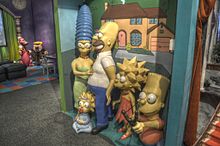Anexo:Personajes de Los Simpson
Este anexo recoge a la mayoría de los personajes ficticios que han aparecido en la serie de televisión estadounidense Los Simpson.La mayoría de los integrantes de la familia Flanders tienen nombres que riman con Dios (en inglés, God).En Hispanoamérica, Familia Alegría.En Hispanoamérica, Familia Gorgory.
